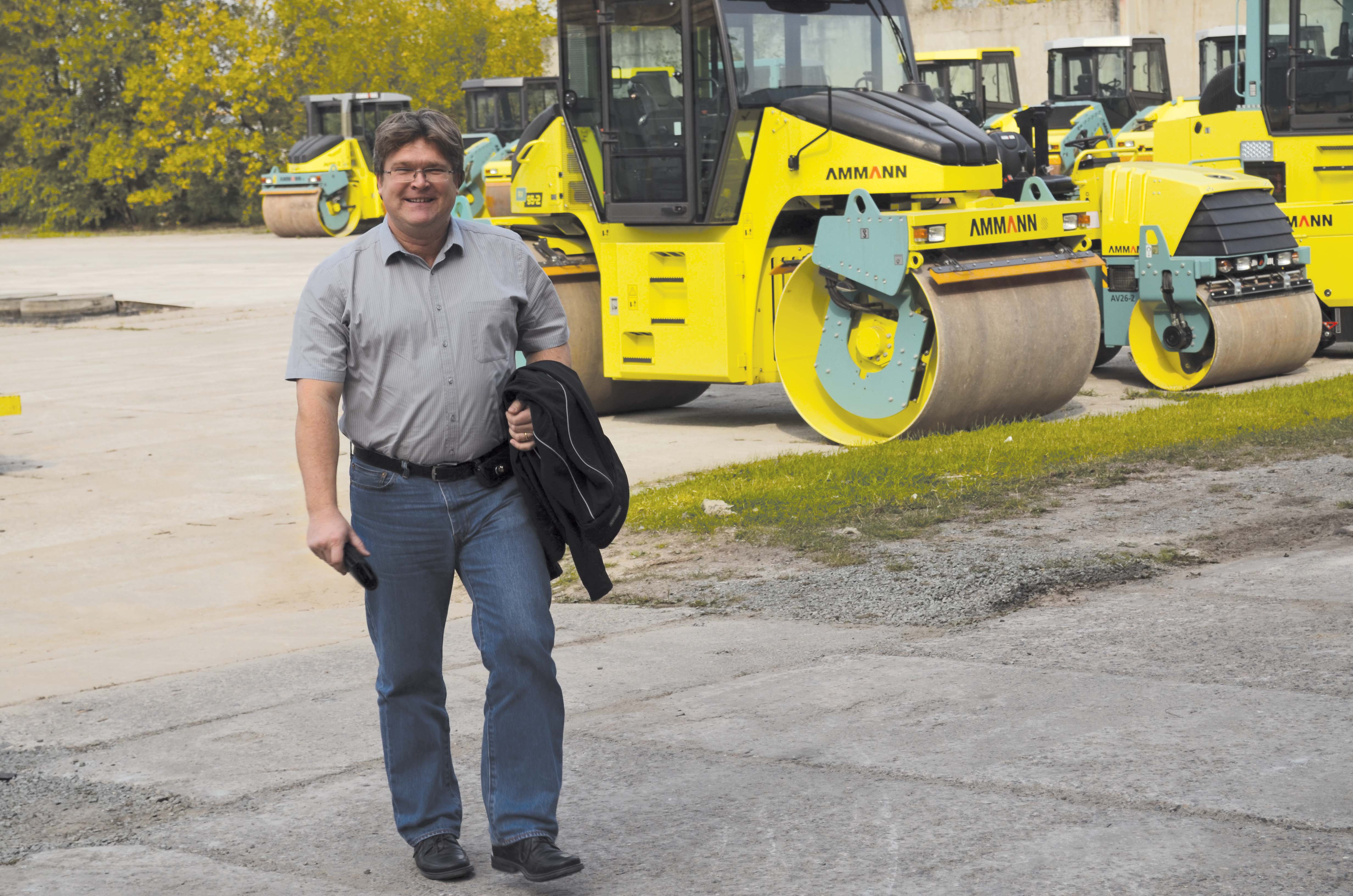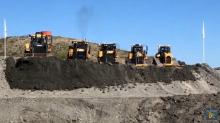Far too often, managers will view training as a luxury and not as a competitive and strategic necessity. Lazy team leaders regularly argue that it is a waste of time and money training their people, not least because these same trainees might subsequently leave the organisation. Courses are seen as an interruption, and a good way to delay things. There is always something much more pressing and important on the to-do list and staff can end up feeling forced into the training department. But these are weak a

Martin Sedlacek - after sales project manager Ammann
Far too often, managers will view training as a luxury and not as a competitive and strategic necessity. Lazy team leaders regularly argue that it is a waste of time and money training their people, not least because these same trainees might subsequently leave the organisation. Ammann could not disagree more and is investing hard in its people and its training centre in the Czech Republic.
Courses are seen as an interruption, and a good way to delay things. There is always something much more pressing and important on the to-do list and staff can end up feeling forced into the training department. But these are weak arguments and the signs of a failing company. High performance industry leaders all invest heavily in training and development. They know that well-trained and properly motivated staff can make the difference between winners and losers.
This is why the Ammann Group has invested so successfully in its international service training centre in Nove Mesto, two hours north of Prague in the Czech Republic. The Swiss-based road construction equipment manufacturing group could not be clearer: “well-educated personnel is the best investment” if you want to work at “the highest quality levels” it says.
And the firm is right. Across a wide range of industries, research has proven that companies with properly trained staff benefit from improved recruitment outcomes as potential employees look for an environment that will encourage personal growth and development; from the ability to hire people with the right attitude; from better staff retention rates; and from improved output figures as motivated workers put their new knowledge and skills into their everyday activity.
The real key to success, however, is getting buy-in from the top. Ammann’s after sales project manager Martin Sedlacek, who oversees the company’s international training centre, knows that he has the backing of the group’s most senior managers. He knows that without a commitment from top management, training will be nothing more than a charade. And he knows that he has their support in training everyone in the Ammann world who wants to come.
Sedlacek stresses again and again, when you visit their high quality facilities in Nove Mesto, that everyone in the group, from the top to the bottom, must believe that “training is a process and not a one-off.” He is running a school that brings in internal trainees as well as staff from the Ammann Group’s external dealer and service network around the world. He is committed to developing an excellent learning atmosphere.
Going through a basic product familiarisation course, and walk and talk through the Nove Mesto factory, it became obvious than Sedlacek and Ammann are getting it right.
The group has built its training operation into the fabric of the business. It is referred to enthusiastically in corporate communications, business plans and individual performance goals for staff. Dealers are made aware that their service teams should get proper, officially-endorsed Ammann training and that this could easily be part of their formal annual appraisals. Sedlacek is keen to help the group’s network realise that there is a direct correlation between training courses where new skills and experience can be realised, and the career success of the individuals concerned.
Ammann certainly follows the old adage that “I hear and I forget. I see and I remember. I do and I understand.” There is a mix at the Nove Mesto centre between the classroom and hands-on, practical, self-paced learning. Disassembled machines are everywhere in the centre and circuit systems like spaghetti across a purpose-built training bench. Technical support trainer Petr Burdych takes students through subjects at the right speed, constantly checking trainees have understood what is being discussed. Burdych has all the latest computer-assisted and web-enabled gadgetry imaginable and cleverly probes you, at the end of the course, to find out if you feel you can now go out and apply the skills you have just been studying. He stressed how he “always tells people to now go out and practice what you have just learned here on the job.”
“We always do through the theory, of course,” said Burdych, “but we always add a hands-on practical session too. We have laid out all of the roller controls on a bench panel so that students can really get a feel for how to adjust and repair the settings systems.” Nobody goes away with just a set of diagrams in a folder.
It is all about making progress and achieving high standards ... for Ammann as a company, for its dealers and service partners as a professional market network, and for the people themselves in their careers. Burdych knows that more or less everyone who comes to the Nove Mesto centre will have “certain weaknesses which can make it difficult to give the best service.”
Therefore, he added, “our training will help them overcome these weaknesses and strengthen their skills.” His aim is to get every trainee leaving Nove Mesto able to work at a high and uniform level. Confidence and consistency is what he and Sedlacek aim for, and they do it in a very pleasant and non-threatening way. Sedlacek wants everyone to leave feeling better informed and carrying one of the centre’s course certificates.
This is not just about being more efficient, better organised and better motivated. Sedlacek knows that many managers are hard-nosed and hate wasting money when trading is tough and the economic outlook uncertain. “A well-trained team,” he said, “means that there is very little wastage of resources, and extra expenses are minimised. Accidents rate go down too if your staff are properly trained.” Ammann trained service personnel need less management input and can work confidently without lots of management supervision and checking.
“We also realised that we needed to have very predictable fixed training fees too,“ said Sedlacek. Not long after taking over the Ammann training centre, he opted for an all-inclusive fixed fee approach so that “before someone sends a trainee here, the manager making the decision knows exactly what it is going to cost – everything including transfers to and from the airport, hotels, food, drink, the training materials and documents … everything. There are no surprises, and it had proved a really popular selling point. The only thing we don’t include is the air fare to Prague.” Another focus is on keeping the atmosphere.
“We are big enough to cover everything we need to cover, but the overall feel should be small. We want a friendly, family feeling to the centre and we want people to go away feeling part of it all.” It works. You sense it when you are there.
“And people come,” said Sedlacek, beaming at a large group of high school children touring the facility during our time in Nove Mesto. “We are investing in the future. It definitely works.”Measuring training
How can you really measure the key cost- benefits of training? “Easy,” said after sales project manager Martin Sedlacek, “you look carefully at the warranty and supplier negotiation costs. We know that it is important to train people practically on the machines they will be supplying in the field but, just as importantly; we work hard on getting them familiar with all of the company’s most important software packages and admin systems. We can clearly see who has, and who has not, taken the time to train their staff properly.” Those who have not done the training are slower and their admin and warranty claim costs are higher.
Everything is monitored and systemised too. The first is a “kick-off form” said Sedlacek, “where you tell us what you do in your job day-to-day, where you are based, who you work for, what you think you know, and what Ammann brands you are familiar with. Then we train you accordingly.”
Then, when it is all over, there is the “evaluation form” where Sedlacek and the team analyse the feedback. They will look at every aspect of the courses, from what type of equipment generates most interest as how teams deal with issues raised by the ACE automatic variable frequency and amplitude sensory system and the challenges of helping end-users avoid over-compaction and under-compaction.
There is a training calendar, with a series of standardised modules set out. “But it is to our advantage to supply bespoke courses, “ said Sedlacek. “I prefer to do a more detailed and tailor-made course, so that the customer goes away happy. 80% of what we do comes down to individual requests from dealers and partners. Two-and-a-half years ago we had to push our dealers to train staff. Now we are getting requests from all over the world. This year we will be doing two courses in Russia, three in Latin America and four in France, for instance.”
When does the trainee need to be refreshed, and brought back up-to-date with the latest technological changes? “We usually contact people every two-and-a-half to three years,” said Sedlacek, and we move people from basic to advanced to dedicated courses as they go through the system.” There are two training classrooms and the centre will run two parallel courses, with 70% of the content being biased towards the bigger kit, like the heavy compaction equipment and the big rollers. It can be very complicated stuff. But it can be easily summed up too. “For me, it is about seeing training as a key part of your business,” said Radek Remes, the single drum roller product manager at Ammann. “Do it well and the business benefits will follow.”
Courses are seen as an interruption, and a good way to delay things. There is always something much more pressing and important on the to-do list and staff can end up feeling forced into the training department. But these are weak arguments and the signs of a failing company. High performance industry leaders all invest heavily in training and development. They know that well-trained and properly motivated staff can make the difference between winners and losers.
This is why the Ammann Group has invested so successfully in its international service training centre in Nove Mesto, two hours north of Prague in the Czech Republic. The Swiss-based road construction equipment manufacturing group could not be clearer: “well-educated personnel is the best investment” if you want to work at “the highest quality levels” it says.
And the firm is right. Across a wide range of industries, research has proven that companies with properly trained staff benefit from improved recruitment outcomes as potential employees look for an environment that will encourage personal growth and development; from the ability to hire people with the right attitude; from better staff retention rates; and from improved output figures as motivated workers put their new knowledge and skills into their everyday activity.
The real key to success, however, is getting buy-in from the top. Ammann’s after sales project manager Martin Sedlacek, who oversees the company’s international training centre, knows that he has the backing of the group’s most senior managers. He knows that without a commitment from top management, training will be nothing more than a charade. And he knows that he has their support in training everyone in the Ammann world who wants to come.
Sedlacek stresses again and again, when you visit their high quality facilities in Nove Mesto, that everyone in the group, from the top to the bottom, must believe that “training is a process and not a one-off.” He is running a school that brings in internal trainees as well as staff from the Ammann Group’s external dealer and service network around the world. He is committed to developing an excellent learning atmosphere.
Going through a basic product familiarisation course, and walk and talk through the Nove Mesto factory, it became obvious than Sedlacek and Ammann are getting it right.
The group has built its training operation into the fabric of the business. It is referred to enthusiastically in corporate communications, business plans and individual performance goals for staff. Dealers are made aware that their service teams should get proper, officially-endorsed Ammann training and that this could easily be part of their formal annual appraisals. Sedlacek is keen to help the group’s network realise that there is a direct correlation between training courses where new skills and experience can be realised, and the career success of the individuals concerned.
Ammann certainly follows the old adage that “I hear and I forget. I see and I remember. I do and I understand.” There is a mix at the Nove Mesto centre between the classroom and hands-on, practical, self-paced learning. Disassembled machines are everywhere in the centre and circuit systems like spaghetti across a purpose-built training bench. Technical support trainer Petr Burdych takes students through subjects at the right speed, constantly checking trainees have understood what is being discussed. Burdych has all the latest computer-assisted and web-enabled gadgetry imaginable and cleverly probes you, at the end of the course, to find out if you feel you can now go out and apply the skills you have just been studying. He stressed how he “always tells people to now go out and practice what you have just learned here on the job.”
“We always do through the theory, of course,” said Burdych, “but we always add a hands-on practical session too. We have laid out all of the roller controls on a bench panel so that students can really get a feel for how to adjust and repair the settings systems.” Nobody goes away with just a set of diagrams in a folder.
It is all about making progress and achieving high standards ... for Ammann as a company, for its dealers and service partners as a professional market network, and for the people themselves in their careers. Burdych knows that more or less everyone who comes to the Nove Mesto centre will have “certain weaknesses which can make it difficult to give the best service.”
Therefore, he added, “our training will help them overcome these weaknesses and strengthen their skills.” His aim is to get every trainee leaving Nove Mesto able to work at a high and uniform level. Confidence and consistency is what he and Sedlacek aim for, and they do it in a very pleasant and non-threatening way. Sedlacek wants everyone to leave feeling better informed and carrying one of the centre’s course certificates.
This is not just about being more efficient, better organised and better motivated. Sedlacek knows that many managers are hard-nosed and hate wasting money when trading is tough and the economic outlook uncertain. “A well-trained team,” he said, “means that there is very little wastage of resources, and extra expenses are minimised. Accidents rate go down too if your staff are properly trained.” Ammann trained service personnel need less management input and can work confidently without lots of management supervision and checking.
“We also realised that we needed to have very predictable fixed training fees too,“ said Sedlacek. Not long after taking over the Ammann training centre, he opted for an all-inclusive fixed fee approach so that “before someone sends a trainee here, the manager making the decision knows exactly what it is going to cost – everything including transfers to and from the airport, hotels, food, drink, the training materials and documents … everything. There are no surprises, and it had proved a really popular selling point. The only thing we don’t include is the air fare to Prague.” Another focus is on keeping the atmosphere.
“We are big enough to cover everything we need to cover, but the overall feel should be small. We want a friendly, family feeling to the centre and we want people to go away feeling part of it all.” It works. You sense it when you are there.
“And people come,” said Sedlacek, beaming at a large group of high school children touring the facility during our time in Nove Mesto. “We are investing in the future. It definitely works.”Measuring training
How can you really measure the key cost- benefits of training? “Easy,” said after sales project manager Martin Sedlacek, “you look carefully at the warranty and supplier negotiation costs. We know that it is important to train people practically on the machines they will be supplying in the field but, just as importantly; we work hard on getting them familiar with all of the company’s most important software packages and admin systems. We can clearly see who has, and who has not, taken the time to train their staff properly.” Those who have not done the training are slower and their admin and warranty claim costs are higher.
Everything is monitored and systemised too. The first is a “kick-off form” said Sedlacek, “where you tell us what you do in your job day-to-day, where you are based, who you work for, what you think you know, and what Ammann brands you are familiar with. Then we train you accordingly.”
Then, when it is all over, there is the “evaluation form” where Sedlacek and the team analyse the feedback. They will look at every aspect of the courses, from what type of equipment generates most interest as how teams deal with issues raised by the ACE automatic variable frequency and amplitude sensory system and the challenges of helping end-users avoid over-compaction and under-compaction.
There is a training calendar, with a series of standardised modules set out. “But it is to our advantage to supply bespoke courses, “ said Sedlacek. “I prefer to do a more detailed and tailor-made course, so that the customer goes away happy. 80% of what we do comes down to individual requests from dealers and partners. Two-and-a-half years ago we had to push our dealers to train staff. Now we are getting requests from all over the world. This year we will be doing two courses in Russia, three in Latin America and four in France, for instance.”
When does the trainee need to be refreshed, and brought back up-to-date with the latest technological changes? “We usually contact people every two-and-a-half to three years,” said Sedlacek, and we move people from basic to advanced to dedicated courses as they go through the system.” There are two training classrooms and the centre will run two parallel courses, with 70% of the content being biased towards the bigger kit, like the heavy compaction equipment and the big rollers. It can be very complicated stuff. But it can be easily summed up too. “For me, it is about seeing training as a key part of your business,” said Radek Remes, the single drum roller product manager at Ammann. “Do it well and the business benefits will follow.”









